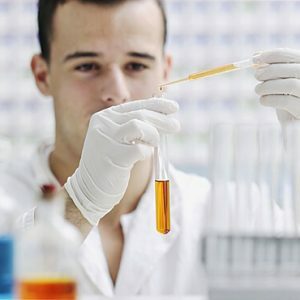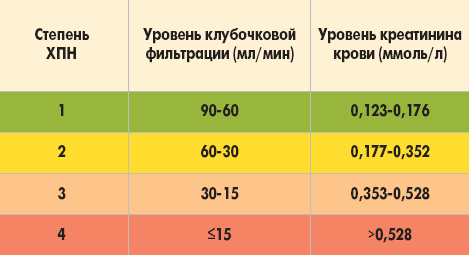Treatment of kidney stones: features of surgical and conservative treatment of kidney stones
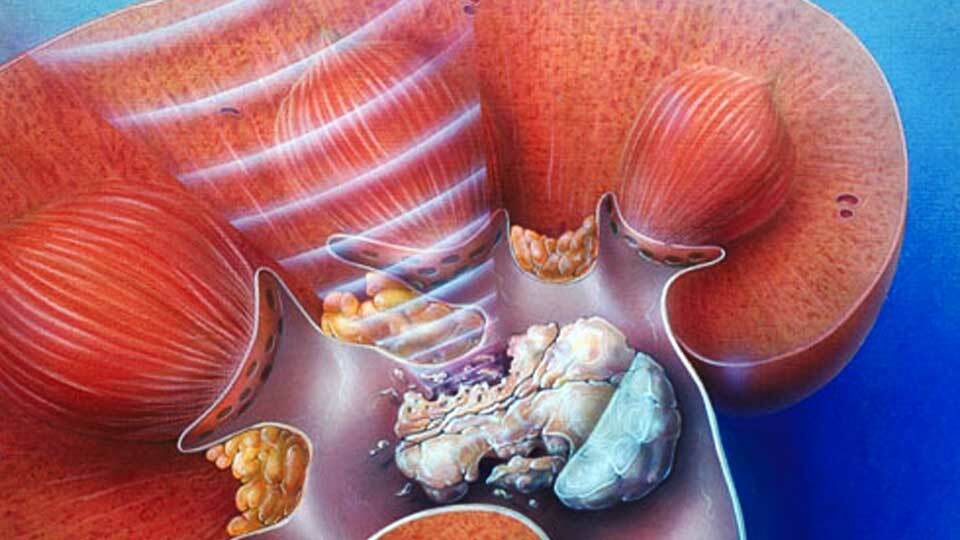 Kidney stones( nephrolithiasis) - a very common pathology, the main manifestation of urolithiasis.The prevalence of this disease is 5 cases per 1000 adult population.Stones and sand in the kidneys manifest painful syndrome in the lower back - the so-called renal colic.
Kidney stones( nephrolithiasis) - a very common pathology, the main manifestation of urolithiasis.The prevalence of this disease is 5 cases per 1000 adult population.Stones and sand in the kidneys manifest painful syndrome in the lower back - the so-called renal colic.
Kidney stones - causes of
formationStone formation is caused by changes in acid-base balance of urine.As a result of this process, the salts dissolved in the urine begin to crystallize, forming stones. The following factors contribute to this process:
- Genetic predisposition - in favor of this factor is evidence of family nephrolithiasis - the appearance of stones in close relatives.Lack of drinking and dehydration.
- .They lead to an increase in the concentration of salts in the urine, which provokes their precipitation - first formed microliths( small stones), and then large concretions.
- Incorrect power.The predominance of meat in the diet, the lack of vitamin A or D also contribute to stone formation.
- The pathology of the endocrine system.Hyperparathyroidism( pathology of the thyroid gland), osteomyelitis, osteoporosis lead to a breakdown in the mineral balance and a change in the acidity of urine, which leads to the appearance of concrements.
- Diseases of the gastrointestinal tract.Gastritis, colitis, stomach and duodenum ulcers contribute to the increased excretion of minerals from the body, becoming the trigger mechanism of stone formation in the kidneys.
- Inflammatory diseases of the urinary tract.Pyelonephritis, cystitis, urethritis lead to a difficulty in the outflow of urine, causing it to stagnate and creating favorable conditions for the precipitation of salts in the form of sediment( sand in the kidneys is formed).
Treatment of kidney stones
Most patients begin to treat kidney stones when renal colic develops, accompanied by unbearable pain and forcing the patient to see a doctor.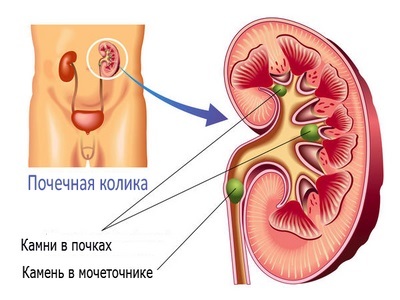 In this case, symptomatic treatment is realized - pain relief syndrome with analgesics and antispasmodics.After an attack, colic stones can go out on their own.However, one should not think that the illness has been cured and will not return any more - it's time to consult a doctor and find out how the stones are taken out of the kidneys and whether it is possible to prevent recurrence of renal colic.
In this case, symptomatic treatment is realized - pain relief syndrome with analgesics and antispasmodics.After an attack, colic stones can go out on their own.However, one should not think that the illness has been cured and will not return any more - it's time to consult a doctor and find out how the stones are taken out of the kidneys and whether it is possible to prevent recurrence of renal colic.
Kidney stones fragmentation
One of the most modern methods of treatment of urolithiasis is crushing stones - lithotripsy.The easiest way for patients to tolerate is remote lithotripsy( ESWL) - the fragmentation of urinary stones without skin incisions.Unfortunately, not all stones can be destroyed in this way.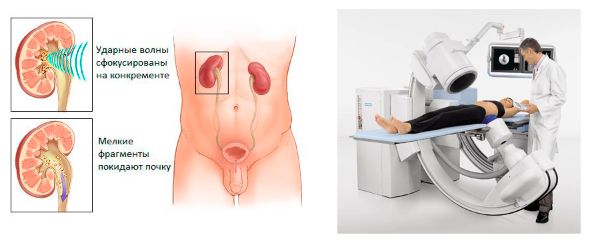 Endoscopic technique is used for crushing, for example during contact lithotripsy, in which an endoscope with a lithotriptor( crushing device) is inserted into the kidney through the urethra, bladder and ureters.In this case, the device directly contacts the stone.As a crushing agent, ultrasound can be used.
Endoscopic technique is used for crushing, for example during contact lithotripsy, in which an endoscope with a lithotriptor( crushing device) is inserted into the kidney through the urethra, bladder and ureters.In this case, the device directly contacts the stone.As a crushing agent, ultrasound can be used.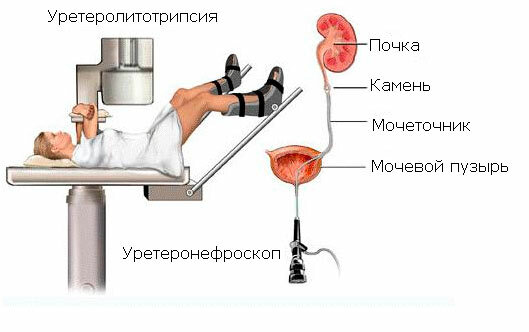 Another method of using endoscopic technique is transcutaneous lithotripsy - crushing kidney stones by means of a lithotriptor injected into the kidney through a small incision in the lumbar region.
Another method of using endoscopic technique is transcutaneous lithotripsy - crushing kidney stones by means of a lithotriptor injected into the kidney through a small incision in the lumbar region.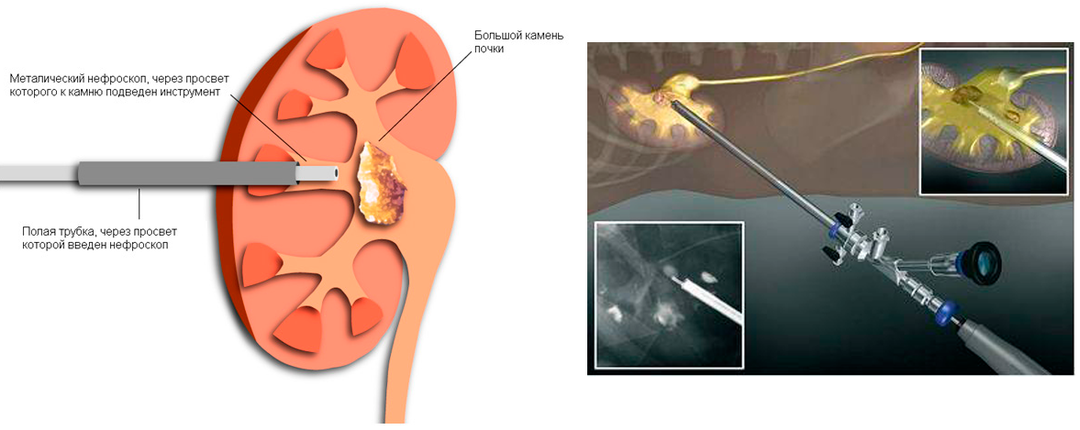 If the stones in the kidneys are exposed to a laser to destroy them - they talk about laser lithotripsy.
If the stones in the kidneys are exposed to a laser to destroy them - they talk about laser lithotripsy.
Operations with kidney stones
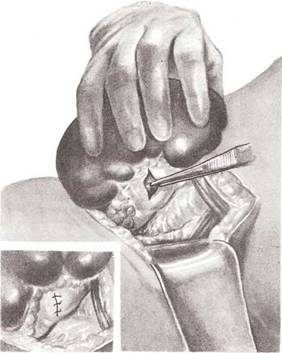 Two main operations are used to remove kidney stones: pyelolithotomy and nephrolithotomy.In the first case, the surgeon dissects the pelvis of the kidney and through it removes the stones.This operation is shown with ineffectiveness of other methods of treatment.Nephrolithotomy is the most difficult operation for the patient, as in her course the kidney itself is cut and the kidney tissue is damaged.Removal of stones from the kidneys through this operation is performed only for life indications, with complications of urolithiasis and at the risk of losing the kidney.Recently, the frequency of surgery with kidney stones has significantly decreased, as more and more effective drugs are developed that cause the dissolution of calculi.
Two main operations are used to remove kidney stones: pyelolithotomy and nephrolithotomy.In the first case, the surgeon dissects the pelvis of the kidney and through it removes the stones.This operation is shown with ineffectiveness of other methods of treatment.Nephrolithotomy is the most difficult operation for the patient, as in her course the kidney itself is cut and the kidney tissue is damaged.Removal of stones from the kidneys through this operation is performed only for life indications, with complications of urolithiasis and at the risk of losing the kidney.Recently, the frequency of surgery with kidney stones has significantly decreased, as more and more effective drugs are developed that cause the dissolution of calculi.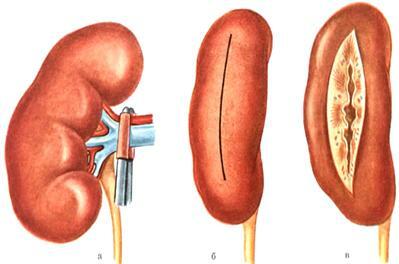
Diet for kidney stones
Changing dietary habits in urolithiasis is one of the effective methods for preventing stone formation. General recommendations that will suit all patients with this pathology:
-
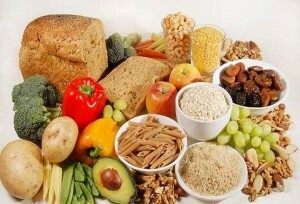 sufficient fluid intake( at least 2 liters per day), while water should be drunk in small portions throughout the day;
sufficient fluid intake( at least 2 liters per day), while water should be drunk in small portions throughout the day; - diet - eat better in small portions - 5-6 times a day;
- from the diet should exclude sharp, salted, smoked products;
When compiling a diet, the type of stones characteristic of this patient is taken into account, therefore the diet is made by a doctor only after a thorough examination.
Recommended to read: 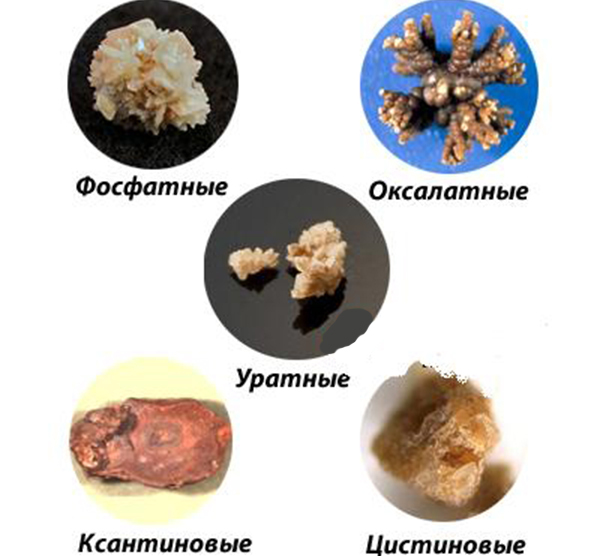 With different types of stones, you will have to abstain from various products.And exactly:
With different types of stones, you will have to abstain from various products.And exactly:
- Oxalatite stones.It is necessary to refrain from eating foods rich in organic acids, especially oxalic acid.Such products include: sorrel, citrus, potato, spinach.
- Uranium stones.Urea is the final product of protein metabolism, so with urate stones, you should reduce the amount of meat products consumed.
- Phosphate stones in the kidneys are formed during the alkalization of urine, so the diet with this type of stones is aimed at acidifying urine.This can be achieved by limiting the consumption of dairy products, vegetables and fruits.Dissolve phosphate stones acidic mineral water( for example, from Truskavets, Zheleznovodsk).
Treatment of kidney stones with
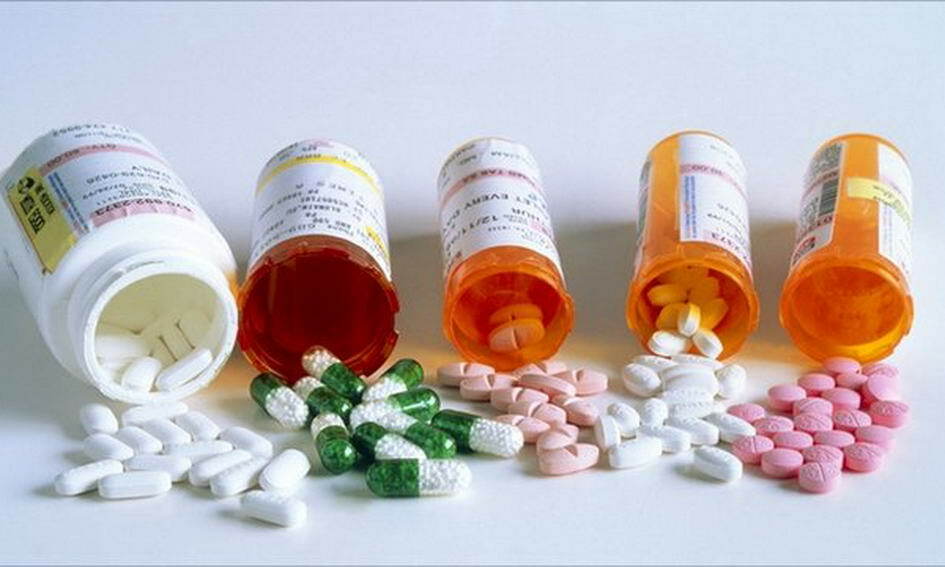 tablets Conservative treatment is most effective for small stones - up to 4-5 millimeters in size.Assign drugs that change the acid-base balance of urine.Again, when prescribing drugs, you need to consider the type of stones.When phosphate stones are prescribed Trilon B, with urate - Blemaren, Allopurinol, with oxalate - magnesium asparaginate, vitamin B6.In inflammatory complications of urolithiasis, antibacterial agents are prescribed in tablets or injections.A doctor selects a specific treatment plan.It is especially difficult to treat mixed stones in the kidneys, when concrements of different types are simultaneously found.In this case, usually, different treatment regimens are tried successively, controlling their effectiveness with the help of ultrasound.
tablets Conservative treatment is most effective for small stones - up to 4-5 millimeters in size.Assign drugs that change the acid-base balance of urine.Again, when prescribing drugs, you need to consider the type of stones.When phosphate stones are prescribed Trilon B, with urate - Blemaren, Allopurinol, with oxalate - magnesium asparaginate, vitamin B6.In inflammatory complications of urolithiasis, antibacterial agents are prescribed in tablets or injections.A doctor selects a specific treatment plan.It is especially difficult to treat mixed stones in the kidneys, when concrements of different types are simultaneously found.In this case, usually, different treatment regimens are tried successively, controlling their effectiveness with the help of ultrasound.
Traditional treatment of kidney stones
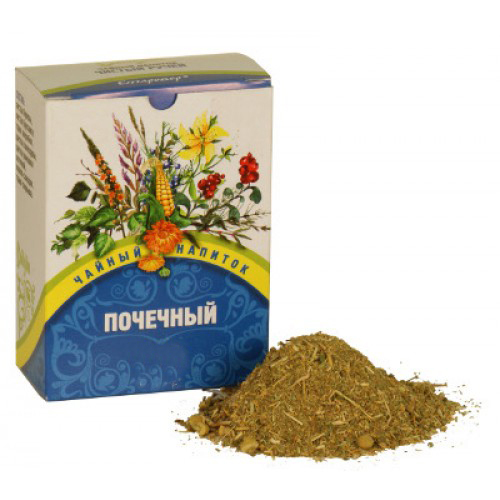 Use of folk methods of treatment in therapy and prevention of urolithiasis is possible, but only in consultation with the doctor.Most of these methods are aimed at stimulating diuresis( urination).Popular treatment with watermelon - its juice has a pronounced diuretic effect, which increases the dissolution of stones.Also used are decoctions and infusions of various herbs: cowberry, madder of dye, parsley, field horsetail and many others.You should be aware that some of these herbs are included in herbal preparations approved by official medicine and used by doctors to dissolve stones.Buy a kidney or kidney tea can be in any pharmacy.More detailed information on modern methods of treatment of urolithiasis you will get by viewing this video review:
Use of folk methods of treatment in therapy and prevention of urolithiasis is possible, but only in consultation with the doctor.Most of these methods are aimed at stimulating diuresis( urination).Popular treatment with watermelon - its juice has a pronounced diuretic effect, which increases the dissolution of stones.Also used are decoctions and infusions of various herbs: cowberry, madder of dye, parsley, field horsetail and many others.You should be aware that some of these herbs are included in herbal preparations approved by official medicine and used by doctors to dissolve stones.Buy a kidney or kidney tea can be in any pharmacy.More detailed information on modern methods of treatment of urolithiasis you will get by viewing this video review:
Gudkov Roman, resuscitator

